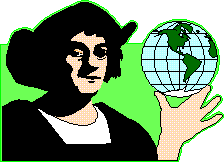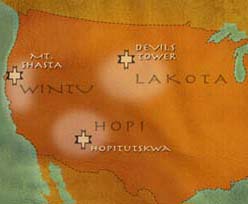 Another Stereotype of the Month entry:
Another Stereotype of the Month entry:
 Another Stereotype of the Month entry:
Another Stereotype of the Month entry:
By David Yeagley
FrontPageMagazine.com | December 19, 2003
Liberal leaders tell Indians like Russell Means to go around the country saying American Indians are spiritually superior to whites. They say Columbus was so impressed with the spirituality of the american natives he found that he called them, "una gente en dios" (a people in God). Indigenous Americans today love the grandeur of this phrase, and it's quoted on many American Indian websites. But I'm afraid it isn't quite accurate.
Though "una gente en dios" is referenced even by quasi-scientific sources like Genealogical Research Using FBI Files, the story behind this faddish phrase involves error and deceit, and indicates anything but spirituality in those Liberals who created it and promote it. It's anti-White chauvinism for liberal Indian talk, and nothing more.
The journals of Christopher Columbus (Crist?bal Col?n) in 1492 record his thoughts about the first human beings he encountered in the Americas. There's no phrase, "una gente en dios." Kirkpatrick Sale, quoting the journal extensively in The Conquest of Paradise (1991) makes no mention of it, nor does the Athena Review (1996-2001), which cites more journal passages than Sale. The absence of such a phrase in these research works is our first clue of fraud.
Furthermore, what Columbus first wrote about the native people October 12 was this: "They all go around as naked as their mothers bore them." In the same entry he wrote, "I believe that they would easily be made Christians, because it seemed to me that they had no religion." The spirituality of these indigenous folk was not something Columbus initially noted, but rather the lack of it. (Of course, to him, spirituality comprised ritualistic Catholicism, so he certainly didn't associate nakedness with spirituality.)
The Spanish language itself offers more clues. One Spanish word for poor or naked is indigente, like the English words "indigent" and "indigenous." (This is curious, because a colloquial Spanish word for "great wealth" or "plenty" is india. But, there's no india gente, or rather, gente india, so indigente for Columbus meant poor and naked.)
It's true that gente, by itself, means "people," and Dios of course means "God," but if "una gente en dios" was ever a meaningful Spanish phrase, Columbus' supposed use of it never survived as a idiomatic phrase in Spanish. Even if being "in God" was a late 15th century idiom for ‘naked,' or ‘birthday suit,' (a point of knowledge in historical linguistics beyond my range), it was short-lived, and wasn't used as such before or since.
But liberal American Indian leaders now believe the name "Indian" was not used by Columbus because he thought he had reached India, but because he called the native people "en dios," instead of indios as the records show. Thus the word "Indian," according to the spiritual malfeasance of liberal linguists, is believed to have derived from "en dios," or, in "God."
To bolster their erroneous superfluity, liberals say no country was called "India" in 1492, but instead it was "Hindustan." Thus error compounds. India was never called Hindustan in Spanish, but India (or China). A northern Aryan province of India was once called in Persian "Hindustan," from the Persian word hindu. Of course, that derives from indus, the Sanskrit word for "river." The great Indus (river) was well known in early English writing. As early as 893 A.D., in his De consolatione philosophiae, Boethius Æfred uses the words India, Indus, and Indea, but not Hindustan.
The Tartar Relation manuscript (ca.1247), written in Latin, regarding the Mongolian invasions toward Eastern Europe, uses the words Indos and Indiam (Latin for "Indians" and "India"), and never Hindu, or Hindustan.
In 1662 John Davies (of Kidwell) translated into English The Travels of J.A. de Mandelslo from Persia into the East-Indies. "Hindou" is used for the first time in English. The words Hindou, Indian, and Pagan appear synonymous.
What did European officials later call the docile natives Columbus first encountered? "Taíno"—good or noble. (Taino is not some tribal name; Later, violent Indians were called Carib, as in Caribbean.). Columbus' first accounts call them all "Indians." The fact is he believed he'd reached India.
So American Indian leaders have simply been misled and once again play the fool for deceitful, leftist social architects. Columbus did not use the phrase "una gente en Dios" in the Journal of the first voyage. But he did write (December 16) that the people "love their neighbors as themselves." Now we're talking spirituality! But let's stick to the text, and drop the homonymic, transnational linguistic manipulation.

Rob's reply
I don't know if Yeagley's explication of the word "Indian" is correct. But it's suspect on at least a couple counts:
One, he cites manuscripts from AD 893 and 1247 as evidence for India being called India. We have no idea whether Columbus was familiar with these texts. In fact, we have no idea if anyone in Europe saw them after their creation. For all we know, the manuscripts may have been hidden in monastic archives and discovered only recently.
As sources for what people commonly called India in 15th-century Iberia, they're unconvincing. Since the printing press didn't exist then, our best guess is that most people were unfamiliar with them. Another good guess is that Yeagley built his entire case on two random references he found after doing some cursory research.
Two, Columbus did not think he had reached India. As Samuel Eliot Morison makes clear in his prizewinning biography, Admiral of the Ocean Sea, Columbus thought he had reached Japan or China or the islands off their coasts. At any moment he expected to find gold-roofed pagodas or Oriental vassals who would take him to meet the great Khan.
The Straight Dope website puts all of Yeagley's speculation to rest. It appears to have the straight dope on the origin of the word "Indian":
The admiral wrote a letter, in Spanish, detailing his discoveries while off the Azores during his homeward voyage. He forwarded this to the royal court, then at Barcelona, shortly after his storm-driven arrival in Lisbon on March 4, 1493. The original manuscript has not survived, but a printed copy made shortly after its receipt has. In the first paragraph Columbus says "In 33 days I passed from the Canary Islands to the Indies" (en 33 días pasí de las islas de Canaria a las Indias). His first reference to the inhabitants comes in the second paragraph: "To the first [island] which I found I gave the name San Salvador . . . the Indians call it Guanahaní" (A la primera que yo hallí puse nombre San Salvador . . . los Indios la llaman Guanahaní). In all he makes six references to India or the Indies, and four to Indios.
The problem with Yeagley
The problem in Yeagley's essay is his opening and closing remarks. In just a couple paragraphs, he makes several erroneous or stereotypical assertions. Specifically:
Yeagley cites certain unnamed websites—as usual, not identifying his sources. But how does he know the political persuasion of those who write about Native spirituality? Is equating "Indians" with "people of God" enough to define someone as a liberal? No. Any God-fearing conservative who championed Native people—e.g., Barry Goldwater, John McCain, various Mormons—might profess the "gente en dios" origin.
In his journals, Columbus made it clear he thought the Natives had no religion and could easily be converted to Christianity. The last thing he would've said is that Native beliefs were superior to or equivalent to his own. And no Native I know has ever spoken admiringly of Columbus's perspicacity. So Yeagley's premise is false even if his analysis isn't.
What "liberals" really believe
Let's set Yeagley straight about liberals. Being a card-carrying one myself, I estimate that 99.9% of us, like 99.9% of all people, aren't sure where the word "Indian" came from. If we believe anything, we believe the conventional explanation: that "Indian" came from the (East) Indies—not India. (According to the Straight Dope, "At the time of Columbus's voyage, 'India' or 'the Indias/Indies' was often used to refer to all of south and east Asia.")
If any liberals believe the "people of God" story, they probably don't spend much time convincing others of it. They definitely don't spend much time convincing strong-willed Indians like Russell Means. Like most people, most Indians are capable of discerning fact from fiction and forming their own opinions.
From what I've seen, most spiritual Indians are quietly confident about their spirituality. They don't need liberals to tell them their spirituality is superior. They get their beliefs from belonging to their age-old cultures. That is, from participating in centuries of time-tested traditions, not from "liberal" websites or cereal boxes.
How many liberals does Yeagley think Means knows, anyway? What if Means knew a thousand liberals and every one of them professed the "people of God" story? Would that justify Yeagley's insinuations about how liberals are trying to mind-control Indians in general? No. As usual, Yeagley's notions are patently ridiculous.
So where exactly is the deceit Yeagley mentioned? As far as I can tell, Yeagley fabricated what liberals believe, fabricated what liberals tell "Indians like Russell Means," and fabricated how these Indians respond. The only deceit I see here is his.
Related links
Yeagley the Indian apple
This ain't no party: a Columbus Day rant
Russell Means speaks
|
. . . |

|
All material © copyright its original owners, except where noted.
Original text and pictures © copyright 2007 by Robert Schmidt.
Copyrighted material is posted under the Fair Use provision of the Copyright Act,
which allows copying for nonprofit educational uses including criticism and commentary.
Comments sent to the publisher become the property of Blue Corn Comics
and may be used in other postings without permission.